Fairfield by Marriott Hangzhou Wulin Square
1 notte
Camere e ospiti
1 camera, 2 adulti, 0 bambini
Tutte le strutture a Hangzhou
Fairfield by Marriott Hangzhou Wulin Square
Aperto nel 2024
No.370, Stadium Road, Gongshu District, Hangzhou, Zhejiang, Gongshu District, Hangzhou, Zhejiang, Cina
Mostra sulla cartina
Fairfield by Marriott Hangzhou Wulin Square is located in Gongshu District, Hangzhou City, No. 370 Stadium Road, close to Hangzhou Theatre, Hangzhou Mansion; There is a perfect business travel and tourism facilities. The hotel is conveniently located 5 minutes' walk from Hangzhou Mansion Shopping City. Hangzhou CBD Business District is about 5 minutes' on foot. A 20-minutes’ drive to Hangzhou Railway Station East.Mostra di più
Corrispondenza del prezzo
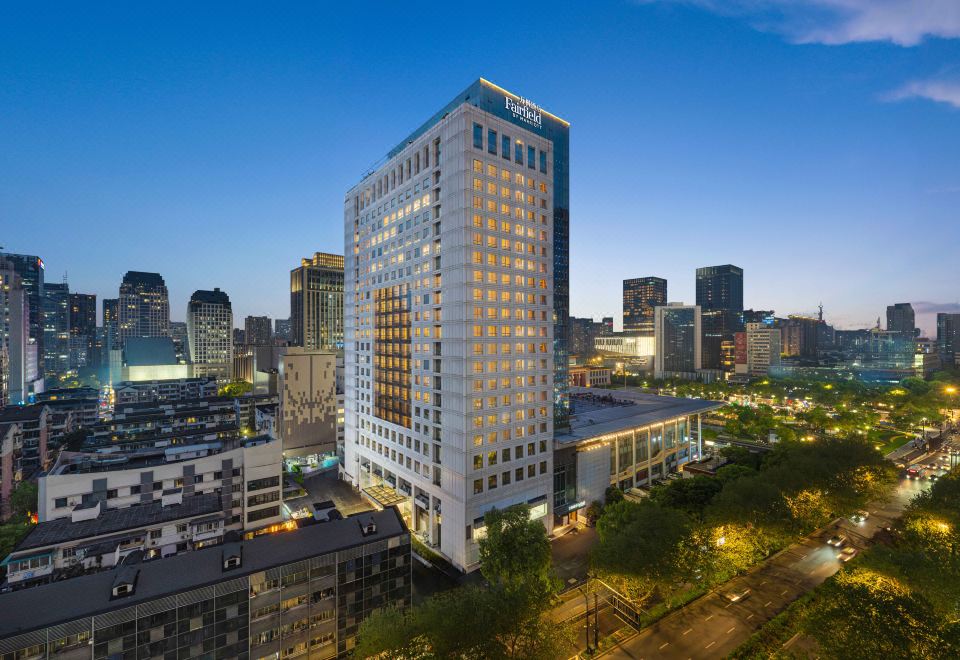
Ultima prenotazione: 2 ora/e fa
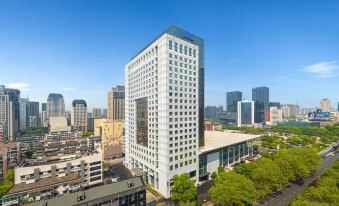
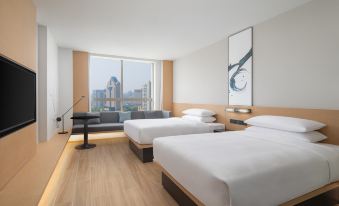
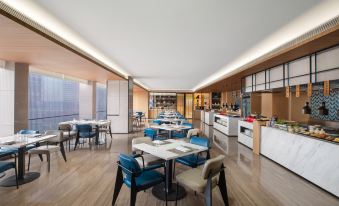
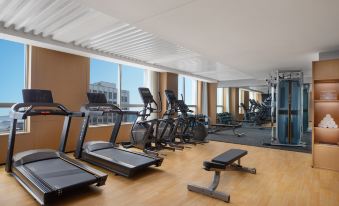
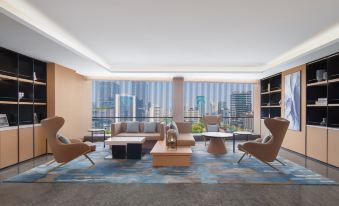
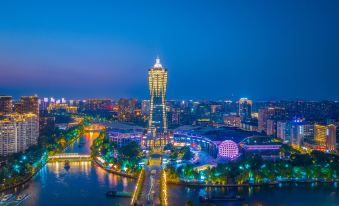

 Entry-friendly
Entry-friendly Facile da raggiungere
Facile da raggiungere Strumenti di traduzione
Strumenti di traduzione Sono accettati la maggior parte dei pagamenti con carta
Sono accettati la maggior parte dei pagamenti con carta Parcheggio gratuito
Parcheggio gratuito Colazione variegata
Colazione variegataMostra di più
Servizi
PalestraGratis
2 parcheggi pubbliciGratis
Reception con servizio 24 ore su 24
Deposito bagagliGratis
Ristorante
Robot di servizio
Wi-Fi nelle aree comuniGratis
Lavanderia
Tutti i servizi
Descrizione della struttura
Fairfield by Marriott Hangzhou Wulin Square is located in Gongshu District, Hangzhou City, No. 370 Stadium Road, close to Hangzhou Theatre, Hangzhou Mansion; There is a perfect business travel and tourism facilities. The hotel is conveniently located 5 minutes' walk from Hangzhou Mansion Shopping City. Hangzhou CBD Business District is about 5 minutes' on foot. A 20-minutes’ drive to Hangzhou Railway Station East.
Mostra di più
4.7/5
StraordinarioPulizia4.8
Strutture e servizi4.7
Ubicazione4.7
Servizio4.8
Tutte le 220 recensioni
Dintorni
Metro: Wulin Square
(350m)
Metro: Wulinmen
(610m)
Aeroporto: Aeroporto Internazionale di Hangzhou Xiaoshan
(29,5 km)
Aeroporto: Deqing Moganshan Airport
(36,7 km)
Treno: Hangzhou Railway Station
(6,0 km)
Guarda sulla cartina
Camere
Recensioni degli ospiti
Strutture e servizi
Regolamento

4
Camera Standard King
1 Letto matrimoniale
26 m² | 11-14º piano
Con finestra
Wi-Fi gratuito
Non fumatori
Aria condizionata
Bagno privato
Frigorifero
Pulizia giornaliera
Controlla la disponibilità

4
Camera Standard (2 letti)
2 Letto matrimoniale alla francese
26 m² | 11-14º piano
Con finestra
Wi-Fi gratuito
Non fumatori
Aria condizionata
Bagno privato
Frigorifero
Pulizia giornaliera
Controlla la disponibilità

4
Camera accessibile ai disabili
2 Letto matrimoniale alla francese
26 m² | 14º piano
Con finestra
Wi-Fi gratuito
Non fumatori
Aria condizionata
Bagno privato
Frigorifero
Pulizia giornaliera
Controlla la disponibilità

7
Camera Selezione (letto matrimoniale, con vista sulla città)
1 Letto matrimoniale
32 m² | 11-14º piano
Con finestra
Wi-Fi gratuito
Non fumatori
Aria condizionata
Bagno privato
Frigorifero
Minibar
Controlla la disponibilità

4
Camera Superior (2 letti)
2 Letto matrimoniale alla francese
28 m² | 11-14º piano
Con finestra
Wi-Fi gratuito
Non fumatori
Aria condizionata
Bagno privato
Frigorifero
Minibar
Controlla la disponibilità

4
Camera Superior Queen
1 Letto matrimoniale
28 m² | 11-14º piano
Con finestra
Wi-Fi gratuito
Non fumatori
Aria condizionata
Bagno privato
Frigorifero
Minibar
Controlla la disponibilità

7
Camera Selezione (2 letti, con vista sulla città)
2 Letto matrimoniale alla francese
32 m² | 11-14º piano
Con finestra
Wi-Fi gratuito
Non fumatori
Aria condizionata
Bagno privato
Frigorifero
Minibar
Controlla la disponibilità

5
Monolocale (letto matrimoniale)
1 Letto matrimoniale
36 m² | 11-14º piano
Con finestra
Wi-Fi gratuito
Non fumatori
Aria condizionata
Bagno privato
Frigorifero
Minibar
Controlla la disponibilità
Nascondi i tipi di camere
Recensioni degli ospiti
4,7/5
Straordinario
220 recensioni
 Recensioni verificate
Recensioni verificate- Pulizia4,8
- Strutture e servizi4,7
- Ubicazione4,7
- Servizio4,8
Media per strutture simili a Hangzhou

SJong
9 dicembre 2024
Conveniently located at the shopping area. There a laundry room that's very important for travellers on long trip. Hotel do not have smokey smell which is good.
Traduci

-M-G
29 ottobre 2024
1. No lobby and we arrived raining didi alight us at roadside. Though no long walk but will get wet.
2. Recept at 14 flr with 2 lifts serving waited a while during peak hr
3. Bath amenities only two bottles on wall and both shower gel. Next day inform recept and get it change
4. Shower ceramic/marble seat tile collapse w a loud bang.. Lucky happened after our bath else likely will our toes will get fracture. See pic
5. Contacted recept abt it n she send a cleaning lady down n took a photo. Received a call from the recept n said will change a room for us n ask me go up to collect the door key. We will in shocked and ask her can't she send the key down. She replied will send the key via robot. The writing of the room number on the key jacket showed how this recept lady attitude toward her work. See pic.. Tell me what is the last digit.. I thought was 1 so went try open yet can't. Called her and was told is 9. Cannot imagine this kind of services this hotel providing and not even feel sorry for the guest going through this unexpected event. At the end we have to pack our stuffs and shift to the other room.
Traduci

Utente ospite
1 dicembre 2024
Everything about Fairfield had been superb and our stay was beyond splendid!
Traduci

Yvonne@0126
9 luglio 2024
Very good and clean . Good service. Strongly recommended to others business travelers and vacation. Will book again next trip
Traduci

Utente ospite
26 dicembre 2024
Service at the hotel was fantastic. With a self-service laundry, front desk staff would diligently check the washers and help guests transfer their laundry to the dryer. The staff at the buffet restaurant was also super attentive and offered to increase the room temp (it was winter) after seeing that my infant was not dressed in sufficient layers. After ordering my soup noodles for bfast, the staff gestured for me to take a seat and he would bring over the noodles as he would afraid my baby would be scalded. When asked for a straw for the yoghurt cup, they made it a point to provide paper straw (instead of plastic) for fear that a plastic straw would cut the baby’s lips. Excellent service, excellent location and excellent staff!
Traduci

Utente ospite
16 gennaio 2025
Very good experience though the main entrance is not very obvious from the main street. However, we enjoyed the stay.
Traduci

MAXELL TOHSHIN
19 novembre 2024
Location:
Proximity to Popular Districts: The hotel should be situated near vibrant areas known for their food culture and shopping experiences, such as downtown, city centers, or culturally rich neighborhoods.
Access to Public Transportation: A location close to subway stations or bus stops makes it easy to explore various gastronomic and shopping hotspots in the city.
Food:
Diverse Dining Options: The hotel should be surrounded by a variety of restaurants, cafes, and street food vendors offering different cuisines, from local delicacies to international fare.
Local Market Access: Being near a food market or specialty grocery store can enhance the culinary experience with fresh ingredients and local snacks.
Restaurants with Good Ratings: Proximity to highly-rated establishments, food halls, or popular eateries is a plus.
Shopping:
Retail Districts and Malls: The hotel should ideally be close to major shopping streets, boutiques, and malls that cater to various tastes, from high-end brands to unique local shops.
Unique Shops and Markets: Access to artisanal markets, vintage shops, and local crafts enhances the shopping experience.
Cultural Souvenirs: The area should also provide opportunities to find locally made products or unique souvenirs to take home.
Additional Amenities:
On-Site Dining: A hotel with its own restaurant or café can offer convenience for guests who prefer to dine without venturing out, especially after long days of shopping or exploring.
Concierge Services: Helpful concierge staff can provide recommendations for the best local dining experiences and shopping deals.
Comfortable Accommodations: The hotel should offer comfortable and well-equipped rooms, ensuring a restful stay after enjoying the local culinary and shopping delights.
Traduci

Utente ospite
14 novembre 2024
No cold air conditioning during my stay in early Nov, was offered a fan. I was disappointed as the outside temperature was 22 degrees. The room didn't cool down that much. The hotel corridor was cooler than my room. Hotel is located after a carpark gantry, Didi drivers refuse to turn into the compound, unable to pick us up right outside the hotel. Got to load and unload all luggage further down, by the busy main road. Amenities are new and clean as it is a new hotel. Mixed feelings.
Traduci

Sophia
16 gennaio 2025
Convenient, cute robot to send delivery to room , washing machine n dryer avaliable!
Traduci
Strutture e servizi
Servizi più richiesti
Palestra
Gratis
2 parcheggi pubblici
Gratis
Reception con servizio 24 ore su 24
Deposito bagagli
Gratis
Ristorante
Robot di servizio
Wi-Fi nelle aree comuni
Gratis
Lavanderia
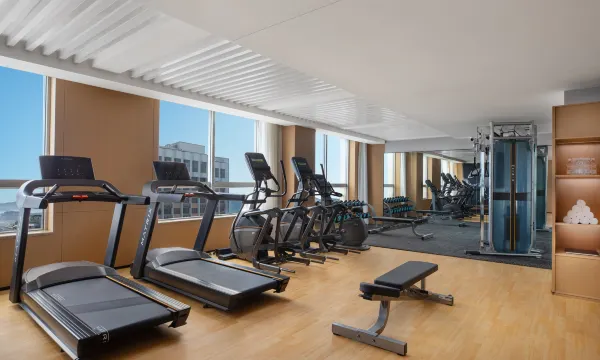
Palestra
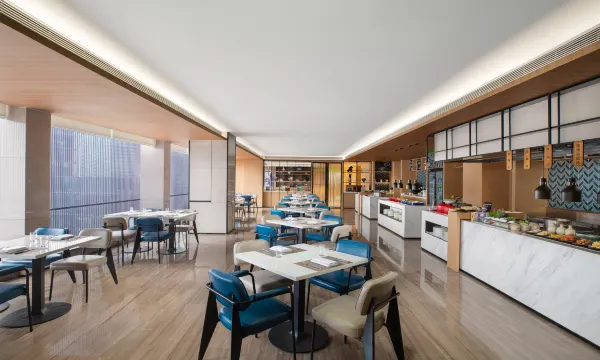
Ristorante
Ristorante
万枫餐厅
Stile: Buffet
Aperto per: Colazione
Orario di apertura: [LUN - DOM] 06:30-10:30
Altri servizi
Internet
Wi-Fi nelle aree comuni
Gratis
Parcheggio
Pubblico disponibile presso l'hotel. Non è necessario prenotare.
Parcheggio pubblico 2
Gratis
Parcheggio pubblico 1
Gratis
Servizio reception
Cassaforte alla reception
Deposito bagagli
Gratis
Reception con servizio 24 ore su 24
Check-in e check-out rapidi
Check-in con lettore di carta d'identità elettronica
Strumenti di traduzione disponibili
Lingue parlate
Inglese
Cinese
Ristorazione
Bar
Salute e benessere
Palestra
Gratis
Aree comuni
Ascensore
Vietato fumare nelle aree comuni
Piano non fumatori
Depuratore d'acqua
Sistema di ventilazione
Robot di servizio
Servizi di pulizia
Detersivo per il bucato
Ferro da stiro verticale
Lavanderia
Strutture per bambini
Ciabatte per bambini
Accappatoi per bambini
Servizi aziendali
Servizio postale
Accessibilità
Camere accessibili disponibili
Dispositivi di allarmi visivi nei corridoi
Sicurezza
Videosorveglianza nelle aree comuni
Kit di pronto soccorso
Allarme antincendio
Sistema di controllo degli accessi con chiave elettronica
Estintore
Rilevatore di fumo
Allarme antintrusione
Addetti alla sicurezza
Rilevatore di monossido di carbonio
Regolamenti della struttura
Orari di check-in e check-out
Check-in: 14:00–06:00.
Orario del check-out: prima delle 12:00
Orari della reception: 24 ore su 24, 7 giorni su 7
Se arrivi al di fuori degli orari di check-in, contatta la struttura con 1 giorno di anticipo via telefono
Ospiti accettati
Questa struttura accoglie ospiti provenienti da qualsiasi Paese o regione
Regolamento per i bambini
In questo hotel possono soggiornare bambini di qualsiasi età.
I bambini di età compresa fra 0 e 7 anni possono soggiornare gratuitamente se non sono necessari letti extra.
Culle e letti supplementari
Il regolamento relativo alle culle e ai letti extra potrebbe variare in base al tipo di camera. Controlla i dettagli del tipo di camera per ulteriori informazioni.
Colazione
Tipooccidentale, cinese
StileBuffet
Orario di apertura[LUN - DOM] 06:30-10:30 Aperto
| Altezza | Costo |
|---|---|
Bambini di altezza inferiore a 1.2 m | gratis |
Bambini di altezza nella fascia 1.2-1.4 m | 34,00 CNY(circa 4,49 €) a persona |
Bambini di altezza superiore a 1.4 m | 68,00 CNY(circa 8,97 €) a persona |
Adulto | Buffet:68,00 CNY(circa 8,97 €) a persona |
Eventuali costi aggiuntivi per la colazione non sono inclusi nell'importo totale e devono essere pagati direttamente presso la struttura.
Regolamento relativo ai depositi
DepositoÈ richiesto un deposito
Metodi di riscossione dei depositiIl deposito viene stabilito in base al numero di camere prenotate. L'addebito è di 500,00 CNY (circa 65,92 €) per camera.
Forme di pagamento dei depositicarta di credito
Rimborso dei depositiIl deposito verrà riaccreditato sul conto utilizzato per il pagamento iniziale entro 7 giorni dalla data del check-out.
Animali domestici
Animali domestici non ammessi
Animali di servizio
Animali di servizio ammessi su richiesta
Requisiti di età
L'ospite principale che effettua il check-in deve avere minimo 18 anni.
Pagamento in hotel










- Contanti
Descrizione della struttura
- Aperto nel 2024
- Numero delle camere: 128
Fairfield by Marriott Hangzhou Wulin Square is located in Gongshu District, Hangzhou City, No. 370 Stadium Road, close to Hangzhou Theatre, Hangzhou Mansion; There is a perfect business travel and tourism facilities. The hotel is conveniently located 5 minutes' walk from Hangzhou Mansion Shopping City. Hangzhou CBD Business District is about 5 minutes' on foot. A 20-minutes’ drive to Hangzhou Railway Station East.